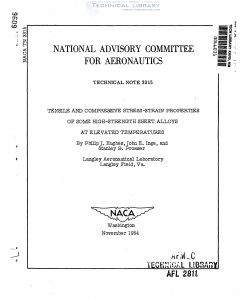naca-tn-3315
- Version
- 159 Downloads
- 863.57 KB File Size
- 1 File Count
- January 23, 2017 Create Date
- January 23, 2017 Last Updated
National Advisory Committee for Aeronautics, Technical Notes - Tensile and Compressive Stress Strain Properties of Some High Strength Sheet Alloys at Elevated Temperatures

Results of tensile and compressive stress-strain tests at temper-
atures up to l,200° F are presented for SAE hfiho, Ey—Tuf, Stainless w,
and Inconel X sheet materials which were heat treated to provide ulti-
mate tensile strengths at room temperature in the 170 to 220 ksi range.
The materials were exposed to the test temperature for 1/2 hour before
loading and were tested at a strain rate of approximately 0.002 per
minute.
Representative tensile and compressive stress—strain curves are
given for each.material at the test temperatures. The variation of the
tensile and compressive properties with temperature is shown for speci-
mens tested parallel and transverse to the rolling direction of the
materials. Secant and tangent moduli, obtained from the compressive
data, are included.
Missiles and aircraft at supersonic speeds require materials for
their construction which can withstand the adverse effects of elevated
temperatures. A number of programs have been in progress to supply
information on the properties of various ferrous and nonferrous alloys
which may be used for this purpose (for example, refs. 1 to 5).
The results of tensile and compressive stress-strain tests of three
ferrous alloys, SAE hBhO, Hy—Tuf, and Stainless W, and one nickel alloy,
Inconel X, are presented herein. The compressive data for these materials,
with the exception of Hy-Tuf, were previously used to provide a basis for
some structural-efficiency comparisons at elevated temperatures (ref. h).
Conventional shortetime tests were made with the specimens exposed
to the test temperature for 1/2 hour prior to loading. Tensile and com-
pressive stress-strain data taken with and transverse to the rolling
direction are given for all the materials to 1,0000 F. Additional
compressive data are given for Stainless W and Inconel X at 1,2000 F.
| File | Action |
|---|---|
| naca-tn-3315 Tensile and Compressive Stress Strain Properties of Some High Strength Sheet Alloys at Elevated Temperatures.pdf | Download |

Comment On This Post